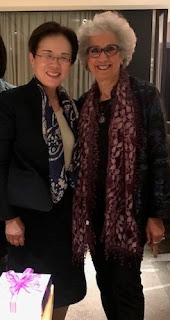World Academy of Nursing Science
Conference
Presented in the Future, in February 2030
Presented in the Future, in February 2030
Osaka, Japan
At the turn of the decade, as we welcomed 2020, designated the Year of the Nurse and the Midwife by the World Health Organization (WHO), we looked forward to showing the world what nurses actually do and to demonstrating their impact on the health and wellbeing of populations. We also looked forward to accomplishing the Nursing Now goals, as well as the Sustainable Development Goals (SDG’s). With 20 million nurses globally, we wanted to have a collective voice in developing and providing appropriate policies to deal with health care challenges that populations faced globally. Two such challenges were providing quality care for older populations and ameliorating the effects of environmental changes within an equity and justice framework.
We considered that since nurses were made up of 90% women globally, the issues and the challenges that
women faced were similar to those that nurses encountered in their practice, as
well as in their scholarship. Therefore, to have a voice and presence in making
a global and a local impact on populations’ health, nurses had to acknowledge and
own historical gender and sex differentials that created marginalization,
oppression and subjugation of nurses and women. These, in turn, contributed to
nurses’ and women’s’ limited presence and participation in affecting policies
that supported women, their work conditions and their wellbeing. These issues
also may have constrained nurses from working up to their full capacity in
their advocacy and caring roles for patients and families, and in ensuring
policies for the delivery of quality care driven by nursing evidence and nursing
perspectives.
It is now 2030, and we are reviewing
our accomplishments in the previous decade. We have a strong collective voice
that contributes to the continuity of care and wellbeing for the elderly and
for all vulnerable populations. Nurses now work in environments that are
healthy and supportive of leadership and have an impact on the quality of
health care. Equity for women, allowing them to function up to their full
capacity and integrate all of their multiple roles through appropriate
resources, benefits, compensation and flexibility, is monitored globally by the
United Nations and WHO.
We achieved all of this
through integrating our practice with academia, leading interprofessional
education and practice, supporting nurses’ health care innovations, enhancing representation
at policy tables and insuring the development and implementation of systems for
accountability that support equity, safety and civility where women/nurses live
and work. We adopted an equity and justice framework, advocated for and demanded
gender equity at all organizational and societal levels. Our “different voices”
for change were valued and we made a difference.
Incredible changes and achievements to celebrate at the turn of the
decade in 2030!
 |
| Afaf Meleis and Noriko Katada |
